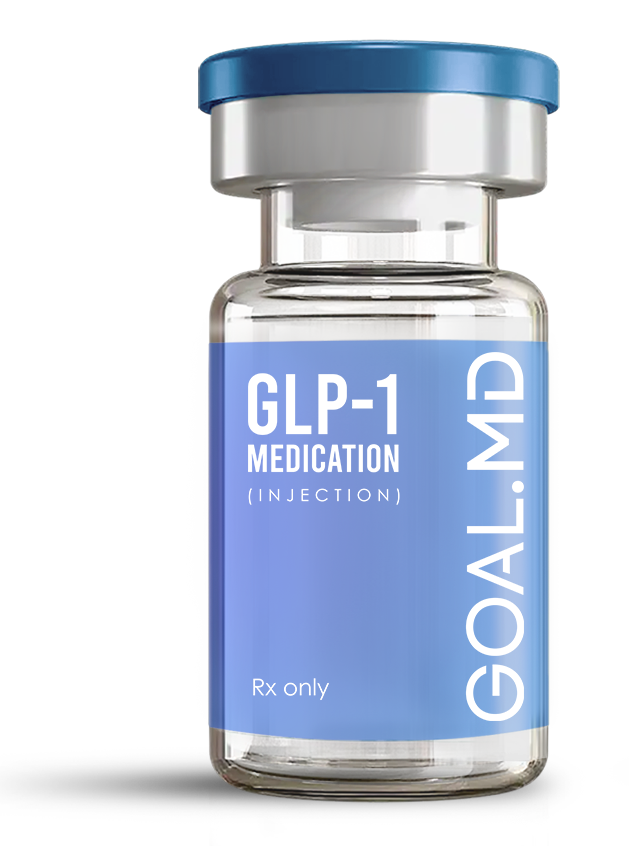
GOAL.MD Health & Wellness Blog
Evidence-based insights, medical weight loss information, and practical tips from our physicians and healthcare experts.

GLP-1s and Mental Health: Can They Help With Food Obsession, Anxiety, or ADHD?
For many, GLP-1 medications such as Ozempic®, Wegovy®, and Mounjaro® are often associated with weight loss. But new research and patient experiences are revealing something even more surprising: these medications may have powerful effects on the brain—particularly in areas tied to mental health, emotional regulation, and attention.
So what’s going on? Could GLP-1s help calm food obsession, reduce anxiety, or even support ADHD symptoms? Let’s break down the brain science—and the possibilities.
What Are GLP-1s, and How Do They Work?
GLP-1 (glucagon-like peptide-1) is a naturally occurring hormone released in your gut after eating. It tells your brain:
You’re full
Your blood sugar is rising
You can slow down digestion
GLP-1 receptor agonists—like semaglutide (Ozempic, Wegovy) and tirzepatide (Mounjaro)—mimic this hormone. While they were originally developed for diabetes, their ability to:
Suppress appetite
Regulate blood sugar
Slow gastric emptying
has led to their explosion in the weight loss world.
But here's what fewer people are talking about: GLP-1 receptors are also found in the brain—including areas tied to reward, mood, and impulse control.
The Brain Science Behind GLP-1 and Mental Health
Emerging studies suggest that GLP-1s do more than regulate hunger. They interact with key regions of the brain:
1. Hypothalamus – Controls hunger and satiety signals
2. Prefrontal Cortex – Responsible for focus, decision-making, and impulse control
3. Amygdala & Hippocampus – Linked to emotional processing, memory, and anxiety
4. Dopamine Pathways – Influence reward, motivation, and addiction
In plain English? GLP-1s may help quiet compulsive thought loops, ease emotional reactivity, and enhance executive function.
Can GLP-1s Help With Food Obsession?
For many users, the first and most noticeable shift on GLP-1s is the quieting of food noise—the constant mental chatter about eating, craving, or restricting.
“For the first time in my life, I’m not thinking about food 24/7,” one Wegovy user shared. “I feel like I can finally focus.”
This isn't just about appetite suppression. It’s about freeing mental space, a game-changer for those with binge eating disorder (BED), emotional eating patterns, or long-term disordered eating behaviors.
GLP-1s and Anxiety: A Surprising Link
Some patients report a calming effect after starting semaglutide or tirzepatide. Why?
Stabilized blood sugar reduces mood swings and irritability
Lower food noise means less guilt, shame, and internal conflict
Gut-brain signaling influences serotonin levels, a key player in mood regulation
That said, not all experiences are positive. Some users report:
Increased anxiety in early dosage phases
Nausea or discomfort triggering anxious responses
Mood blunting (feeling emotionally flat)
The takeaway? GLP-1s may benefit anxiety, especially when food and emotion are deeply connected—but results vary, and careful monitoring is key.
What About ADHD?
While no GLP-1s are approved for ADHD treatment, anecdotal reports are pouring in from patients—and even clinicians—noticing benefits in:
Focus and sustained attention
Reduction in impulsive eating
More structured thinking and executive control
One possible explanation? By modulating dopamine, GLP-1s may indirectly support the same pathways targeted by traditional ADHD medications.
Though not a replacement for stimulants, GLP-1s may offer adjunctive support, especially in adults with coexisting metabolic challenges and executive dysfunction.
Mental Health Cautions with GLP-1s
It’s essential to remember that:
GLP-1s are not psychiatric medications
Individual reactions vary—some experience emotional numbness or increased distress
Those with a history of eating disorders or mood disorders should work closely with a provider before starting
A holistic approach—including therapy, nutrition support, and medication review—is critical for long-term success.
The Bigger Picture: GLP-1s as a Bridge, Not a Cure
GLP-1 medications can create mental clarity by turning down the volume on food preoccupation. But lasting mental health change requires:
Skill-building (emotional regulation, mindfulness, stress management)
Support systems (therapy, community, coaching)
Addressing root causes, not just symptoms
Still, for those whose food obsessions or metabolic challenges have hijacked their brain chemistry, GLP-1s can be a life-changing entry point.
Final Thoughts
GLP-1s are rewriting the story around obesity—but they might also be reframing how we approach emotional wellness, food fixation, and even neurodivergence.
If you’ve ever felt trapped by your thoughts about food or struggled to maintain attention and emotional balance, these medications might do more than help you lose weight. They might help you feel like yourself again.
Explore Safe, Doctor-Guided GLP-1 Care
At GOAL.MD, we don’t just focus on pounds lost—we focus on your whole life:
Medical intake and lab screening
GLP-1 access starting at $297/month
Coaching and education to rebuild your relationship with food
Mental health-aware support at every stage
Start your personalized plan today.» https://goal.md/glp-1-weight-loss-treatment-6904
Why GOAL.MD?
✅ Sourced from audited 503a US compounding pharmacies.
✅ Custom dosages adjusted to your needs.
✅ Free consultation + 24/7 support.

How It Works
1. Quiz
90 seconds. No commitment.
2. Consult
Video chat with your GOAL.MD doctor.
3. Deliver
Meds at your door tomorrow.
Transform Your Life with Physician-Directed Care
Join thousands who've found success with physician-directed care. Take our 3-minute quiz to see if medical weight loss is right for you.








